Category: Something Good About Nursing Homes
Posted by Dr. El - January 6, 2016 - Business Strategies, Communication, For Staff, McKnight's Long-Term Care News, Motivating staff, Psychology Research Translated, Something Good About Nursing Homes

Here’s my latest article on McKnight’s Long-Term Care News:

Woohoo! My first column of 2016.
Which was started during a bout of insomnia in the last week of 2015.
What did I do when sleep failed me? What electronics-addicted individuals often do in the middle of the night. I grabbed my computer, caught up on email, and headed over to Facebook to find out what my Friends had been up to.
There I discovered a post about a company founded by two brothers called Life is Good, which emerged from the standing request the founders’ mother had for them as children in a chaotic home environment: Tell me something good about your day.
This helped the brothers become “glass half full” kind of guys, the type of people who donate 10% of their profits to help children overcome adverse childhood experiences.
And what does a T-shirt company have to do with long-term care? Well…
What if we started off this brand new year asking ourselves and our coworkers, employees and residents to tell us something good?
What if we put time and thought into focusing on the positive — into growing the good — and reminding ourselves why we’re all here working with elders?
I predict we’ll have more productive staff, better functioning teams, and happier residents.
It’s not just me doing the predicting. The Positive Psychology Center, led by director Martin Seligman, Ph.D., describes positive psychology as “the scientific study of the strengths that enable individuals and communities to thrive.”
For the entire article, visit:

Posted by Dr. El - December 23, 2015 - For Fun, McKnight's Long-Term Care News, Something Good About Nursing Homes

Here’s my latest article on McKnight’s Long-Term Care News:

There are many givers in senior care facilities. Sometimes they don’t even realize it themselves. This holiday season is a good time to recognize them — and the things that make smiles bright.
The Twelve Days of Christmas in LTC
On the first day of Christmas, my residents gave to me a thank you for my good care.
On the second day of Christmas, my residents gave to me two knitted mittens and a thank you for my good care.
On the third day of Christmas, my residents gave to me three candy canes, two knitted mittens and a thank you for my good care.
On the fourth day of Christmas, my residents gave to me four graham crackers, three candy canes, two knitted mittens and a thank you for my good care.
On the fifth day of Christmas, my residents gave to me five beaming smiles, four graham crackers, three candy canes, two knitted mittens and a thank you for my good care.
On the sixth day of Christmas, my residents gave to me six warm handshakes, five beaming smiles, four graham crackers, three candy canes, two knitted mittens and a thank you for my good care.
For the entire article, visit:

Posted by Dr. El - November 23, 2015 - Anecdotes, Inspiration, Personal Reflections, Role of psychologists, Something Good About Nursing Homes

Here’s my latest article on McKnight’s Long-Term Care News:

At a conference last week, I remarked to my audience of recreation therapists, “None of us went into this field for the money — we did it for the juice.” And by “the juice,” I mean the good feeling we get from helping seniors and the nice things they say to us in return.
This is why your employees stay, despite everything else.
To get us in the spirit of gratitude for Thanksgiving, I’ve included a sample of comments made by residents to their psychologists. (I solicited material from my colleagues in my favorite shrinky organization, Psychologists in Long-Term Care. I actually heard some of them at work myself, but I’m not gonna tell you which ones.)
• “Without you, I’m like a ship without a rudder.”
• “Girl, I am so happy to see you. I love your smiling face. You help me so much when you come. I don’t feel so crazy.”
• “Thank you for listening to me & not giving up on me.” (Written on a “Wow!” card.)
• “I know you understand. I’m not crazy, but sometimes I feel like I am. My family doesn’t get it and the girls here don’t have time to talk to me.” (LTC Alzheimer’s resident with pain issues.)
• “You help me to look at my life here in a way that my family, friends, and nursing staff can’t.”
• “You don’t know how much it helps to have someone come in and listen and talk to me! I’ve just felt lost. I know I forget things, but since you’ve been coming, it seems like I’m less befuddled!” (LTC resident with early onset Alzheimer’s disease.)
For the entire article, visit:

Posted by Dr. El - September 30, 2015 - Business Strategies, Common Nursing Home Problems and How Psychologists Can Solve Them, Communication, McKnight's Long-Term Care News, Medication issues, Motivating staff, Psychology Research Translated, Role of psychologists, Something Good About Nursing Homes

Here’s my latest article on McKnight’s Long-Term Care News:

Antipsychotic medications have proved ineffective at reducing the symptoms associated with dementia. They also have serious side effects in older adults, including restlessness, dizziness, higher likelihood of falls and other problems that can contribute to an increased risk of death.
Behavioral health interventions, on the other hand, have no such side effects and have been found effective in reducing behaviors such as aggression, care refusal and wandering.
Employing behavioral health techniques with people with dementia becomes increasingly valuable as facilities in this country endeavor to follow the Centers for Medicare & Medicaid Services guidelines and reduce the use of antipsychotic medications.
Global efforts
Dementia care is a pressing issue around the world, and other countries have made headway in shifting from medication to behavioral interventions. Psychologist Paula E. Hartman-Stein, Ph.D., of The Center for Healthy Aging, writes about international programs that implement behavioral health methods in the September/October edition of The National Psychologist.
Dr. Hartman-Stein spoke with Cameron Camp, Ph.D., an expert who consults with long-term care facilities in the United States and abroad.
France
Dr. Camp reports that the French government pays nursing homes to train their staff in non-pharmacological approaches to dementia. The training includes various strategies, including Montessori techniques such as those described by Dr. Camp in his excellent book, “Hiding the Stranger in the Mirror,” and other publications.
Australia
Camp notes that Alzheimer’s Australia provides funding to train staff in behavioral health approaches. Its website, Alzheimer’s Australia Information for Health Professionals, offers helpful information and brief videos that explain the techniques used.
Canada
In Canada, the Canadian Foundation for Healthcare Improvement reports on the success “beyond the team’s expectations” of an effort to reduce antipsychotic medications and implement non-pharmacological approaches. The project saved $400,000 in six months across the Winnipeg region.
STAR-VA in the USA
Here in the United States, the Veterans Health Administration, less constrained by the fee-for-service psychotherapy model that plagues the rest of the country, utilizes staff psychologists and other behavioral health professionals in their Staff Training in Assisted Living Residences (STAR-VA) model.
For the entire article, visit:

Posted by Dr. El - May 13, 2015 - Bullying/Senior bullying, Dementia, McKnight's Long-Term Care News, Resident care, Something Good About Nursing Homes

Here’s my latest article on McKnight’s Long-Term Care News:

I’ve been fortunate enough to attend several senior living conventions recently and my enthusiasm for the experience has yet to diminish. If you haven’t yet had the opportunity to be present for a conference (or if it’s been a while since your last one), consider these reasons for attending:
• There are interesting discussions that directly relate to day-to-day work. Hearing different ideas and perspectives can offer a new way to handle problems and can help you get out of a work rut.
• The conference discourse provides a great opportunity to brainstorm, on your own or with colleagues and coworkers.
• Attendees are often equally enthusiastic about LTC and the connections made with others there can help implement changes within your organization.
• The new products offered in the expo hall can improve operations and the lives of residents and staff.
• Sharing the lessons learned with coworkers can expand the value of the conference.
If an onsite convention isn’t possible for now, consider attending a virtual event, such as the annual McKnight’s Online Expo, which not only offers educational sessions but also has chat rooms and a virtual expo hall.
My experience at ALFA
My most recent conference was the Assisted Living Federation of America convention last week in Tampa, where I spoke at the session “The Importance of Environmental Factors in Senior Living.” During my whirlwind visit to ALFA, I was also able to take in two presentations and spend time in the expo hall.
One of the sessions was on using recreational activities as a way to improve morale among residents and staff and to promote your organization in the community. I’ve spoken about these goals in my audio, “10 Steps to Making Recreation the Most Valuable Department in the Nursing Home,” and I was encouraged to hear of unique ways senior organizations have been serving these dual objectives, such as knitting caps for premature babies.
The conversation among participants helped me think about the impact that the pro-social engagement of residents has on reducing the problem of senior bullying. If seniors are busy doing good in the world, not only are they less likely to be engaging in negative behavior such as bullying, but the organization has helped to create a culture of caring.
The second talk was a roundtable on engaging staff in order to reduce turnover. The suggestions focused on hiring for attitude and training for skills, being clear about the mission of the organization, and implementing programs that reward employees for their good work.
Expo hall jewels
As usual, I searched the expo hall to find products I knew my residents would appreciate.
Having heard far too many elders complain bitterly about pureed food, I was delighted to find a company that offered puree solidified into colorful, shaped molds that were far more appetizing than typical puree. The saleslady looked askance at my glee about getting to sample her wares — but regular readers know I like to experience things from the residents’ perspective whenever possible.
For the entire article, visit:

Posted by Dr. El - March 18, 2015 - Dementia, McKnight's Long-Term Care News, Something Good About Nursing Homes

Here’s my latest article on McKnight’s Long-Term Care News:

When I learned about Neurocognitive Engagement Therapy for rehabilitation residents, I had the same reaction I did when I first heard about geriatric emergency rooms: Palm-smack to the forehead, “Why didn’t we think of this before?!”
Of course people with dementia aren’t going to do well in traditional rehabilitation settings. We’ve been putting them in large, over-stimulating rooms and asking them to accomplish tasks that are meaningless to them. No wonder they become agitated or withdrawn and are unable to engage in treatment.
Enter NET therapy. Using a $25,000 grant from the Alzheimer’s Foundation of America, Phoebe Ministries, in conjunction with various academic partners, developed and studied neurocognitive engagement therapy, which combines the best practices of dementia care with the tasks of occupational, physical and speech therapies.
The elements of NET Therapy
Like geriatric emergency rooms, one aspect of the NET model involves changing the physical environment so that it’s calming and more conducive to engagement in treatment, such as working one on one rather than in a group.
For the entire article, visit:

Posted by Dr. El - October 3, 2014 - Dementia, For Recreation Staff, McKnight's Long-Term Care News, Something Good About Nursing Homes
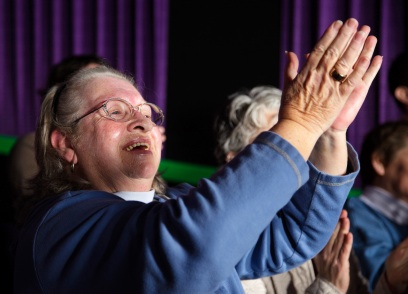
Here’s my latest article on McKnight’s Long-Term Care News:

Greetings from Montana! I was in Billings last week conducting a training session for the Montana Department of Health. An enthusiastic group of over 100 LTC staff members from various departments joined the discussion and I came away with some excellent suggestions on how to engage residents with dementia.
The subject of how to best provide care for people with dementia without using antipsychotic medications was a particularly hot one at the conference. As well it should have been.
The topic is particularly timely given that CMS has increased its antipsychotic reduction goal from 15% (below 2011 levels) this year to 25% next year and 30% below for 2016. As G. Allen Power, MD, pointed out in his recent McKnight’s article, antipsychotic medication reduction should be preceded by educating staff members about alternatives to medication.
One important alternative is offering activities that enrich the lives of people with dementia so that they’re engaged in positive pursuits that build on remaining strengths.
Many participants in the Montana training were from the recreation/activities/life enrichment departments and they shared some great ideas they’ve successfully used to engage residents with dementia. These include:
- Off-campus trips to a variety of locations, including many of the scenic outdoor attractions in Montana. “A lot of work, but worth it!”
- A “whack-a-mole” game where residents use water pistols to shoot down plastic cups decorated as moles. A game such as this allows residents to release anger in a healthy, socially acceptable manner. (It was suggested that since I’m from New York City, we use a “whack-a-rat” version, but I think New Yorkers might enjoy “whack-a-pigeon.” Pigeons, or “flying rats,” as some people refer to them, are much more ubiquitous and annoying but get less media attention.)
For the entire article, visit:

Posted by Dr. El - September 26, 2014 - Books/media of note, Inspiration, Something Good About Nursing Homes
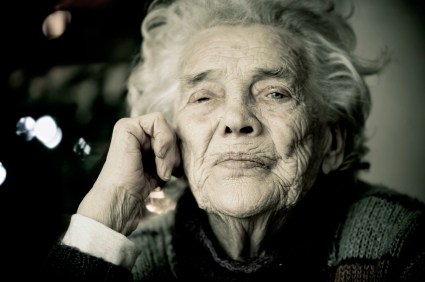
Signature HealthCARE alerted me (via Tweet!) about their Quality of Life program where they recognize outstanding residents and others in their community. On October 9th at 6pm ET, Signature HealthCARE will simultaneously induct over 350 distinguished individuals in 87 care centers into their Hall of Fame.
The Signature Hall of Fame website contains a gallery of photos and stories of the accomplishments of inductees in various areas of life such as leadership, public service, and volunteerism. I particularly like the section on personal accomplishments. See the video below (or click here) to find out more about the program.
As a psychologist I’ve heard many very private stories of residents who have lived for years with persistent pain, came through a childhood of prejudice, abuse, and/or poverty, and work hard to keep a positive attitude despite disability. As I’ve told some of “my” residents, I don’t find celebrity interviews nearly as interesting or impressive as hearing their stories.
If your facility has found a unique way to honor residents and staff, please share it in the Comments section.

Posted by Dr. El - May 22, 2014 - Anecdotes, Books/media of note, Inspiration, Something Good About Nursing Homes
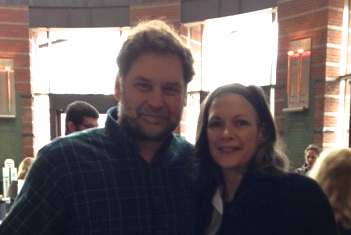

Dr. El and Dr. Bill Thomas
Last month I had the chance to attend the launch of Dr. Bill Thomas’ new book, Second Wind. Bill Thomas, founder of the Eden Alternative and creator of The Green House, has written many books about changing the culture of care in nursing homes. In his new book, he shifts his focus to helping readers understand the background of our youth-obsessed culture and to encouraging a more positive outlook on aging.
The Second Wind event was a combination of music, drama, education and entertainment that left attendees feeling hopeful, energized, and positive. It was exciting to meet so many like-minded people engaged in improving long-term care. LTC often gets bad press, but there are many, many people out there striving to make things better for our elders.
One of these people is Dan Cohen, MSW, Executive Director of Music & Memory, which is a program designed to bring individualized music via iPods to residents with dementia. I wrote here about the astounding success of this program in engaging elders who have previously seemed lost within their dementia. I met Dan Cohen once before and was pleased to see him again at the Second Wind event, where we took the selfie below.
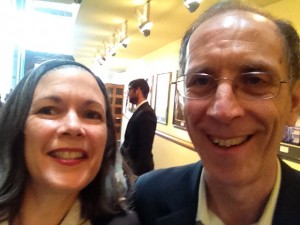
Dr. El and Dan Cohen, MSW of Music & Memory
Posted by Dr. El - March 20, 2014 - Business Strategies, Customer service, Inspiration, McKnight's Long-Term Care News, Resident care, Something Good About Nursing Homes
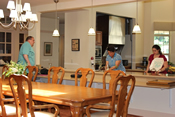
Here’s my latest article on McKnight’s Long-Term Care News:

In my last post, I discussed culture change and its positive impact on the mental health of the residents, particularly at Eden Alternative facilities. I recently also had the opportunity to tour a Green House, which I’d heard about but had never seen. While Eden Alternative homes change the culture of care within existing facilities, The Green House Project creates the “ideal” setting from the ground up.
The template of a Green House is a small building that is home to 10 to 12 residents, or “elders,” and two caregiving “Shahbaz,” which is the plural of Shahbazim. A Shahbazim is an aide trained to do almost everything that needs to be done within the house – providing care for the elders, laundering the clothes and bedding, performing light housekeeping, planning meals, cooking, serving the food, engaging the elders in activities, etc.
The house itself is designed to be more like a home, with private rooms off a large common area that includes a living room, dining area and kitchen.
I found this model turned everything I’d known about nursing homes upside down.
Green Hill visit
The first thing I noticed when I pulled up to Green Hill in West Orange, NJ, aside from the impressive entrance to this former hotel, was that there were parking spots reserved for visitors. By contrast, most of the nursing homes I’ve encountered have reserved spaces for upper level staff. This easily replicable idea offers a person-centered approach even before guests enter the facility.
Green Hill has four Green Houses in addition to its other levels of care. Ten elders reside in each of these small buildings in the back of the campus.
Walking into the Green House was very much like entering someone’s home. As I came through the entryway, there was a small, bright room on my left where I later interviewed one of the elders. On my right was a large, open kitchen. A computer monitor was discreetly tucked in the corner next to a glass cake stand holding a freshly baked cake.
For the entire article, visit:
For more on The Green House Project, visit their website.

Green Hill dining area and kitchen























